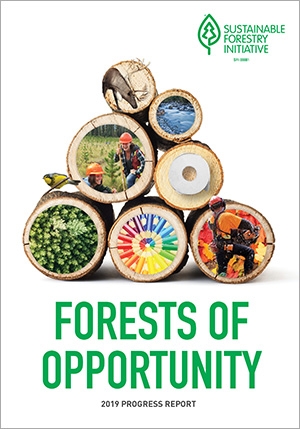
Features
Business
Sustainability
Latest SFI report highlights forest sustainability progress
August 28, 2019 By PrintAction Staff

The Sustainable Forestry Initiative Inc. (SFI) committed in its latest annual progress report to continue advancing sustainability through forest-focused collaborations by maximizing its efforts in standards, conservation, education, and community.
SFI’s 2019 report, Forests of Opportunity, recounts the organization’s accomplishments encouraging and certifying the latest best practices in sustainable forest management with all its partners in Canada and the U.S.
The report reflects the organization’s belief in the wealth of possibilities for economic growth, job‑creation and community building available by taking advantage of the values, goods and services provided by sustainably managed forests and sustainably sourced forest products.
“Forests provide an opportunity to maintain and recover biodiversity and sustain a variety of conservation values, including clean water,” Kathy Abusow, President and CEO of SFI said in the foreword to the 2019 report. “But to seize these opportunities, forests must be sustainably managed and forest products must be responsibly sourced.”
SFI strives to be “a collaborative community committed to high standards, conservation of our forests, sustainable communities and an understanding that environmental education can empower a world that values and benefits from sustainably managed forests,” Abusow said.
Canada and the U.S. lead the world in sustainable forest practices. Contributions to sustainable forestry and a better environment detailed in SFI’s 2019 report include:
Standards
• More than 147 million hectares of forestland is certified to the SFI Forest Management Standard.
• These always-improving standards reduce risk in the supply chain and generate innumerable benefits such as clean water, clean air, enhanced biodiversity, recreational opportunities and green jobs.
• More than 25 percent of Fortune 100 companies carry the SFI on-product label to assure consumers that the product comes from an organization certified to an SFI standard.
Conservation
• Since 1995, SFI Program Participants have directly invested nearly $1.7 billion in forest research. In 2018, about 80 percent of these investments were allocated to conservation-related objectives.
• Since 2010, SFI has awarded 120-plus SFI Conservation and Community Grants, totalling more than $4.4 million, to foster conservation and community-building projects.
• One of these programs is the Canadian Forest Carbon Assessment led by the Saskatchewan Research Council. Recognizing the importance of reducing carbon emissions, the project will provide a roadmap for conducting a comprehensive carbon-stock assessment for the entire land base certified to SFI in Canada.
Community
• In Canada and the U.S., SFI has 34 Implementation Committees supporting training of resource professionals, outreach to family-forest owners and environmental education. Since 1995, SFI program participants have contributed $75 million to the implementation committees.
• In Canada and the U.S., 40 Indigenous groups adopt, support and actively utilize the SFI Forest Management Standard.
• Outland Youth Employment Program is a six-week land-based employment, education and training experience in Canada for Indigenous youth. Since 2018, the SFI and Project Learning Tree Canada networks have contributed over $1.48 million to Outland.
Education
• Project Learning Tree (PLT), SFI’s environmental education initiative, takes students outdoors to learn and connects them to possible green careers.
• Project Learning Tree Canada has assisted more than 2,000 Canadians aged 15-30 years to find green jobs in forestry and conservation while helping communities build the workforce of the future and enabling employers to access to highly motivated young job seekers.
• In Canada, the U.S. and other countries, PLT’s message has reached 138 million students.
SFI is an independent, non-profit organization based in Ottawa and Washington, D.C. that believes that sustainable forests are critical to humanity’s collective future.
Print this page